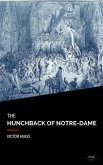The novel contains a unique human experience that combines beauty with ugliness. It carries major implications about emotion. About transcendence, sacrifice and love, about grudges, hatred and revenge. It is one of the most famous romantic novels, because it depicts the strong emotion that the gypsy moves in the hearts of everyone, especially the bell ringer in Notre Dame Cathedral and the priest. It is a wonderful medieval tragedy about fateful fates and the authority of the church. Its events take place during the reign of Louis XI, and its theater is an architectural masterpiece. Bells and bells ring in the corners of the cathedral. In his novel, Victor Hugo delves deep into the world of the homeless and the marginalized, and even the masters who are broken upon themselves before a world in which injustice prevails, and in which hypocrites revel in the name of religiosity. In this work, the poet-writer triumphs over human emotion as a fundamental motive for every social movement that yearns for liberation and emancipation. It is as if the events of Notre Dame at the end of the Middle Ages were the ones that paved the way for the beginnings of the French Revolution in the late 18th century, which Victor Hugo chronicled in his masterpiece, "Les Misérables." Through this novel with captivating events, Hugo succeeded in weaving a fragmented love story between lost characters, and he touched on an elusive equation with ambiguous concepts, which is based on the relationship between the outward character and its inwardness, between outer ugliness and inner beauty, and establishes a very complex philosophical concept, which is a question Beauty and its relationship to what is good and useful, and what it should be.
Dieser Download kann aus rechtlichen Gründen nur mit Rechnungsadresse in A, B, BG, CY, CZ, D, DK, EW, E, FIN, F, GR, H, IRL, I, LT, L, LR, M, NL, PL, P, R, S, SLO, SK ausgeliefert werden.









